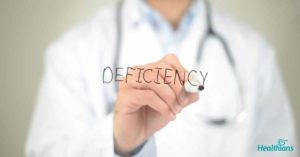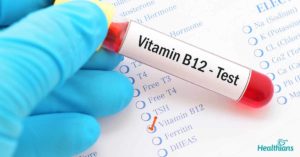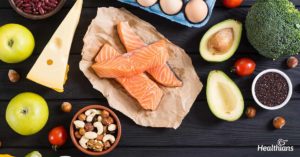Contributed by – Healthians Team
Are you consuming enough Vitamin B12 to sustain the needs of your body? In India, Vitamin B12 deficiency is the most widespread nutritional deficiency. Elderly women and vegetarians are more prone to it. Since the body is unable to produce this vitamin on its own, you have to make sure that your diet contains it in ample amount. If you are unaware about how Vitamin B12 helps your body to stay healthy, then here we have a Guidebook to Manage Vitamin B12 Deficiency which will answer most of your related questions.

What is Vitamin B12 Deficiency?
Our body needs Vitamin B12 to make red blood cells, nerves and DNA synthesis. It also helps the body to carry out other functions. However, like various other vitamins, our body cannot make Vitamin B12 on its own. The only way to fulfil our need for this vitamin is to consume it in the form of food we eat. But the problem is, most of us do not pay attention to our diet and it often lacks important vitamins. As a result, Vitamin B12 deficiency has become extremely common in India. According to different studies, 55 to 80% of Indians are affected by vitamin B12 deficiency.
Your risk of having Vitamin B12 deficiency may be high in the following conditions:
- Strict vegetarian and vegan diet
- Atrophic gastritis or thinning of the stomach lining
- Pernicious anaemia
- Illnesses that affect the small intestine
- Immune system disorders
- Medications that impact absorption of Vitamin B12
- Weight loss surgery
- Increasing age
Symptoms of Vitamin B12 Deficiency
Symptoms of Vitamin B12 deficiency may gradually appear and become severe over time or they can come without any warning. However, these symptoms can overlap with the symptoms of other illnesses.
Following are Vitamin B12 deficiency symptoms:
- Lack of energy
- Tingling sensations in the body
- Forgetfulness
- Weakness
- Constant fatigue
- Weak muscles
- Sudden mood changes
- Blurry vision
- Pale appearance of the skin
- Weight gain
- Mouth ulcers
- Breathlessness and dizziness
It is advisable that you get yourself tested by an experienced physician instead of self-diagnosing. Also, a blood test will help you to identify your levels of Vitamin B12 and will confirm your condition.

Consequences of untreated Vitamin B12 deficiency
Early identification and treatment of Vitamin B12 deficiency is important because if left untreated, its symptoms can worsen and can cause severe neurologic problems and blood diseases.
Following are the risks associated with untreated Vitamin B12 deficiency:
- Stroke
- Irreversible damage to the nerve cells
- Dementia
- Deep vein thrombosis
Understanding test reports
If you have got a blood test done to identify your condition, then understanding test reports on your own can be a challenge. So, the table below will help you get a basic understanding of your test reports and help identify your level of Vitamin B12.
| NAME | REFERENCE RANGE |
| Vitamin B12 chemiluminescence immunoassay (CLIA) | 211.0 – 911.0 pg/ml |
*Reference range may vary from lab to lab
Frequency of the test
In case you test positive for Vitamin B12 deficiency, the follow-up test is recommended as per your treatment.
| TREATMENT | FREQUENCY |
| Injections | After 1 month |
| Tablets and Sachets | After 2 month |
Even if you test negative for Vitamin B12 deficiency, it is advised to get tested for it every 4 months.
Recommended dietary allowance for Vitamin B12
Everybody’s Vitamin B12 requirement depends on their own health status. Age, gender, physical activity, medical conditions, and eating habits – everything plays a role when considering how much Vitamin B12 is needed.
For reference, below is a table to help you understand the recommended average intake of Vitamin B12 per day for both men and women.
| AGE | RECOMMENDED INTAKE |
| 0-6 months | 0.4 mcg |
| 7-12 months | 0.5 mcg |
| 1-3 years | 0.9 mcg |
| 4-8 years | 1.2 mcg |
| 9-13 years | 1.8 mcg |
| 14+ year | 2.4 mcg |
In the case of pregnancy, 2.6 mcg is recommended and in the case of breastfeeding, 2.8 mcg is recommended.

Lifestyle recommendations
Vitamin B12 does not occur in plant-based foods. Due to this reason, those who are on strict vegetarian and vegan diet are at high risk of its deficiency. Vitamin B12 can be found naturally in dairy products and animal products. Thus, the intake of such food is important to maintain the level of Vitamin B12 in the body.
Some foods such as breakfast cereals and soya are fortified with Vitamin B12. You can check the labels to find such food products when you go for grocery shopping next. Also, after consulting your doctor, you can add Vitamin B12 supplements into your diet.
Here is a list of few of the food products which naturally carry Vitamin B12.
- Eggs
- Meat
- Fish
- Beef
- Pork
- Ham
- Poultry
- Lamb
- Dairy products like milk, cheese and yoghurt
Since certain medical conditions can disturb Vitamin B12 levels in the body, it is essential to make sure that your overall health is good. To prevent any diseases, indulge in exercises. Maintain a daily workout routine. Go for a walk or try yoga. Even meditation can help. If you are healthy, you will not only rule out the chances of Vitamin deficiency but will also be able to prevent a wide range of lifestyle diseases.
So, there it is a complete guidebook to manage Vitamin B12 deficiency. A few minor changes to your lifestyle and diet and you can bid farewell to the complications that it brings.




